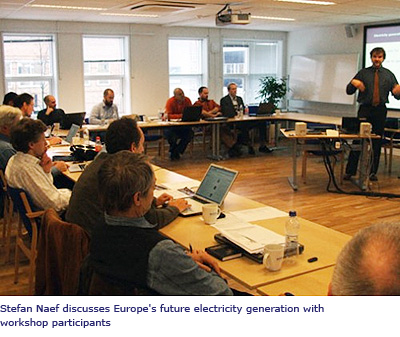European research networking ripe for green action
11 February 2010 | Cambridge, UKNational research and education networking organisations (NRENs) throughout the world are becoming increasingly aware of the environmental impact of their networks and services. Some NRENs are measuring their contribution to greenhouse gas emissions in an effort to reduce their carbon footprints. Others are interested in learning about best practices. These were some of the conclusions discussed during the recent ‘Green Workshop’ in the NORDUnet offices in Kastrup, Denmark on 3-4 February 2010. Participants also stressed the importance of disseminating information about potential environmental policies and practices.

As part of the GÉANT project, the “Study of Environmental Impact” task will evaluate the effects of ICT, particularly wide-area networks, on the environment. The Green Workshop was organised under the auspices of TERENA by the study group, attended by more than 25 participants, mostly NREN managers and technicians responsible for networks and data centres.
Mike Norris (HEAnet), leader of the environmental study, explained some basic facts about the environmental impact of the Internet, which now contributes more to greenhouse gas emissions than the aviation industry. He also outlined the three phases of the study, which begins with baseline audits of the energy and carbon footprints of GÉANT, NORDUnet, HEAnet, PIONIER and HUNGARNET. These audits will be implemented according to ISO standards and will be validated by FORCE Technology, an independent specialised company. The second phase will include the creation of a report on current best practices for indirectly saving energy by using GÉANT and similar networks. The study will conclude in the spring of 2012 with the collection and dissemination of the study results, including recommendations for research networks on environmental sustainability.
In subsequent presentations, Jørgen Moth (UNI•C) and Mike Norris explained how the greenhouse gas audits were carried out for NORDUnet and HEAnet according to a global standard. Additional aspects were presented by study team members Andrew Mackarel (HEAnet) and Rafal Sowinski and Robert Pekal (PSNC). Martin Brooks and John Spence described the GreenStar Network project in a remote presentation from Canada.
The second day of the workshop started with a hands-on session, in which participants were encouraged by Jørgen Moth to contribute to the work of the GÉANT audit. Ole Kjærgaard (UNI•C) spoke about cooling in data centres, and Tamas Maray (NIIF) presented Hungary's experiences with videoconferencing as an application to reduce the environmental impact of national and international research collaboration. The keynote presentation by Stefan Naef (FORCE Technology) gave interesting predictions for how electricity will be generated in Europe in the coming 40 years.
To round off the workshop, Mike Norris collected feedback from all participants, during which strong interest was expressed by all countries represented in sharing experiences and looking into possible joint initiatives. Furthermore, they concluded that priority should be given to spreading information about potential environmental policies and practices to the wider research networking community, by way of publications and presentations at conferences.
The workshop presentation slides are available here: http://www.terena.org/activities/green-workshop/programme.php
About DANTE
DANTE is a non-profit organisation, coordinator of large-scale projects co-funded by the European Commission, and working in partnership with European National Research and Education Networks (NRENs) to plan, build and operate advanced networks for research and education. Established in 1993, DANTE has been fundamental to the success of pan-European research and education networking. DANTE has built and operates GÉANT, which provides the data communications infrastructure essential to the success of many research projects in Europe. DANTE is involved in worldwide initiatives to interconnect countries in the other regions to one another and to GÉANT. DANTE currently manages projects focussed on the Mediterranean, Asia-Pacific and central Asia regions through the EUMEDCONNECT, TEIN and CAREN projects respectively. For more information, visit www.dante.net.
About TERENA
The Trans-European Research and Education Networking Association, TERENA, is the association in which Europe’s research networking organisations, research institutes, equipment vendors and telecommunications operators can meet, exchange information and experience, and collaborate on a range of activities. These activities - projects, task forces and events - are open to any organisation or individual who can offer appropriate expertise, manpower, or other resources

